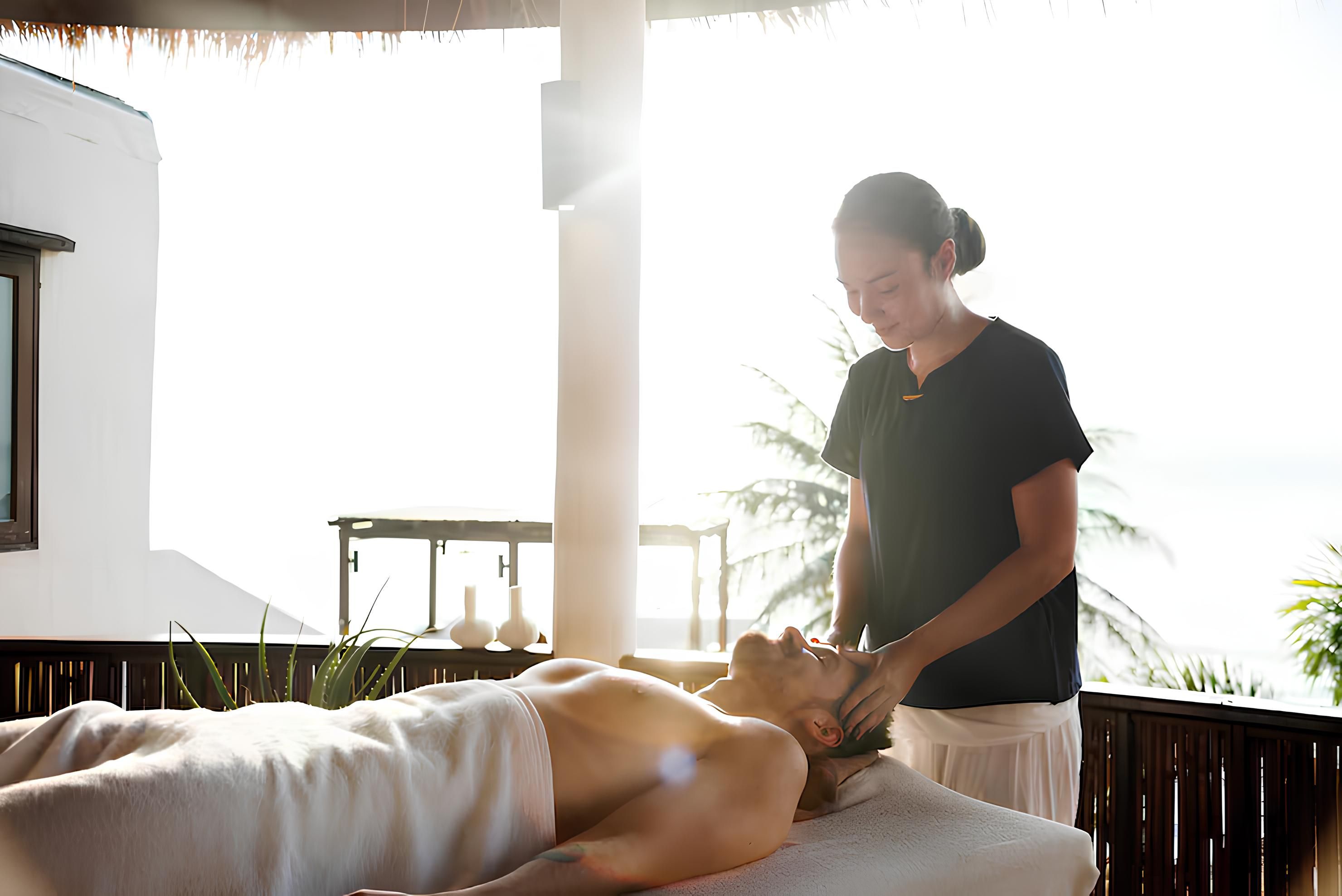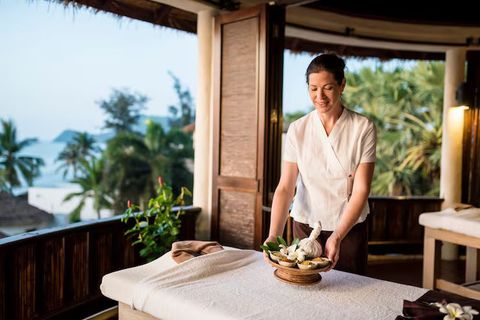Spa retreats in Thailand are wellness-focused centres that offer treatments such as traditional Thai massage, herbal therapy, aromatherapy, meditation, and holistic healing practices. These retreats have existed for decades and are rooted in Thailand's historical healing traditions, which blend local herbal knowledge, Buddhist principles, and body-energy balancing techniques.

Modern spa culture in Thailand expanded significantly due to:
-
Growing global interest in wellness travel
-
Thailand’s reputation for skilled therapists and healing traditions
-
Attractive natural landscapes that support relaxation and recovery
-
Tourism development policies supporting wellness tourism
Today, spa retreats range from simple local shops to luxury resorts offering week-long wellness programs that include detox diets, yoga sessions, meditation classes, hydrotherapy, and beauty treatments. They welcome tourists, expats, and even local residents seeking a break from fast-paced lifestyles.
Importance – Why Spa Retreats Matter Today
Spa retreats have become increasingly important as more people prioritise wellness and stress relief. In today’s environment, many travellers look for experiences that combine leisure with mental and physical benefits.
Who Spa Retreats Affect
-
Tourists looking for restful, rejuvenating experiences
-
Working professionals seeking stress reduction
-
Health-conscious travellers focused on detox, fitness, and wellness
-
Retirees who value therapeutic and gentle treatments
-
Couples and families looking for wellness-inclusive vacations
Problems Spa Retreats Help Solve
Spa retreats help address:
-
Stress and anxiety through relaxation therapies
-
Muscle pain and tension using massage-based treatments
-
Irregular lifestyles through structured wellness programs
-
Poor sleep and fatigue via calming therapies
-
Digital overload through meditation and nature-based activities
The peaceful environment of Thailand’s beaches, forests, and mountains enhances the benefits, making wellness retreats an ideal choice for those seeking balance and relaxation.
Recent Updates – New Trends and Developments
Thailand’s spa and wellness industry continues to evolve, introducing modern techniques while preserving traditional practices. Some notable updates include:
Growing Popularity of Wellness Tourism (2024–2025)
-
Government reports from 2024 indicate a rise in international visitors choosing wellness-focused holidays, especially in Phuket, Chiang Mai, Koh Samui, and Bangkok.
-
Wellness programs are being integrated into many hotels and resorts to meet increasing demand.
Expansion of Digital Wellness Tools (2024)
Retreats increasingly use mobile apps for scheduling therapies, monitoring progress, and offering meditation or breath-work sessions.
Focus on Holistic Packages
Newer spas now blend:
-
Thai massage
-
Organic meal plans
-
Yoga and Pilates
-
Herbal cleansing
-
Mindfulness workshops
Sustainable Spa Practices Introduced (2024–2025)
Many spas are shifting toward:
-
Organic oils
-
Locally sourced herbs
-
Eco-friendly facilities
-
Reduced plastic use
Specialised Treatments Added
Retreats are adding modern therapies like:
-
Sound healing
-
Hydrotherapy pools
-
Infrared saunas
-
Lymphatic drainage massage
These updates show how Thailand’s wellness sector continues adapting to meet global standards and new expectations.
Laws or Policies Affecting Spa Retreats in Thailand
Spa retreats in Thailand operate under specific regulations to ensure safety, hygiene, and professionalism. Key rules include:
Ministry of Public Health Regulations
Spa facilities must follow guidelines related to:
-
Cleanliness and sanitation
-
Equipment standards
-
Therapist training
-
Customer safety procedures
Traditional Thai Medicine Certification
Many spa therapists must be certified by the Department of Thai Traditional and Alternative Medicine (DTAM), which ensures they meet required skills and knowledge standards.
Business Licensing Requirements
Spa centres need:
-
Business registration
-
Health and safety compliance certificates
-
Proper zoning approval for operation
Wellness Tourism Promotion Policies
Thailand’s government supports wellness tourism through programs aimed at improving quality, safety, and international recognition. This includes:
-
Encouraging eco-friendly practices
-
Supporting local herbal production
-
Promoting traditional Thai healing internationally
These regulations help maintain high service quality and ensure traveller safety across spa facilities.
Tools and Resources – Helpful Apps, Websites, and Services
Here are useful tools and resources for planning or understanding spa retreats in Thailand:
Booking and Comparison Platforms
-
Klook – Compare spa packages, read reviews, and check availability
-
TripAdvisor – User reviews and ratings for spas
-
Google Travel – Maps, timing, and location insights
-
Booking.com – Spa-inclusive resort bookings
Wellness and Meditation Apps
-
Insight Timer – Guided meditation sessions
-
Calm – Helps with relaxation and sleep
-
Headspace – Mindfulness and stress-relief exercises
Health and Spa Resources
-
Thai Spa Association – Information on standards and certified spas
-
Department of Thai Traditional Medicine – Details on traditional treatments
-
Tourism Authority of Thailand (TAT) – Wellness tourism updates
Travel Planning Tools
-
Google Maps – For navigation and local reviews
-
XE Currency – Exchange rate calculator
-
AccuWeather – Weather forecasts for travel planning
Table: Common Types of Thai Spa Treatments
| Spa Treatment | Description | Typical Benefits |
|---|---|---|
| Traditional Thai Massage | Stretching + pressure techniques | Flexibility, muscle relief |
| Aromatherapy Massage | Essential oils with gentle massage | Relaxation, improved mood |
| Herbal Compress | Warm herbal pouches | Pain relief, detox support |
| Foot Reflexology | Pressure on foot zones | Improved circulation |
| Hot Stone Therapy | Heated stones on the body | Deep muscle relaxation |
| Body Scrubs | Herbal or salt exfoliation | Skin rejuvenation |
Table: Popular Spa Destinations in Thailand
| Location | Why It Is Popular | Types of Spas Available |
|---|---|---|
| Phuket | Beachfront retreats | Luxury spas, detox centres |
| Chiang Mai | Mountain and cultural ambiance | Traditional wellness, herbal spas |
| Bangkok | Urban convenience | Day spas, wellness centres |
| Koh Samui | Island wellness hubs | Detox retreats, holistic spas |
| Krabi | Peaceful natural setting | Beach spas, eco-wellness |
FAQs – Clear and Helpful Answers
1. What is special about spa retreats in Thailand?
Thailand combines traditional healing, skilled therapists, and natural surroundings, offering a peaceful environment for relaxation and wellness programs.
2. Are spa treatments safe for all visitors?
Most treatments are safe, but individuals with medical conditions should inform therapists beforehand. Reputable spas follow health and safety regulations.
3. How much do spa treatments typically cost in Thailand?
Costs vary widely.
-
Local spas: affordable
-
Resort spas: mid to premium pricing
-
Luxury wellness retreats: higher cost due to full programs
4. What should I look for when choosing a spa retreat?
Check therapist qualifications, reviews, hygiene standards, available treatments, and whether the facility is licensed.
5. Can travellers book spa sessions online?
Yes. Most spas and resorts offer online booking through their websites or platforms like Klook, Booking.com, and TripAdvisor.
Final Thoughts
Spa retreats in Thailand offer a balanced blend of tradition, nature, and modern wellness techniques. They provide relaxation, healing, and a peaceful environment for travellers seeking rest and rejuvenation. Whether someone prefers a simple massage or a structured wellness program, Thailand’s diverse spa offerings ensure that there is something for every preference and budget. As the wellness tourism industry continues to grow, Thailand remains a top destination for those seeking calmness, comfort, and holistic well-being.





